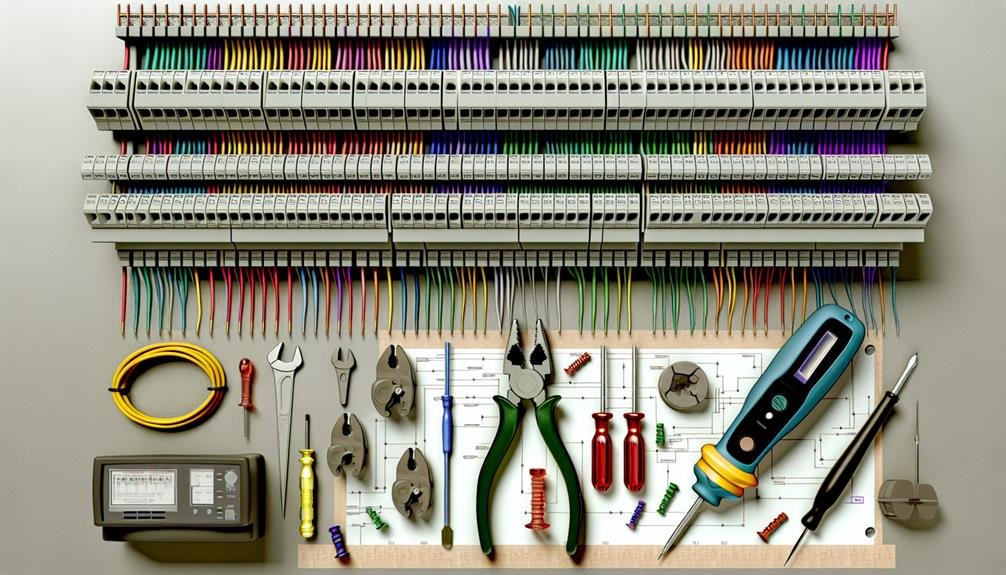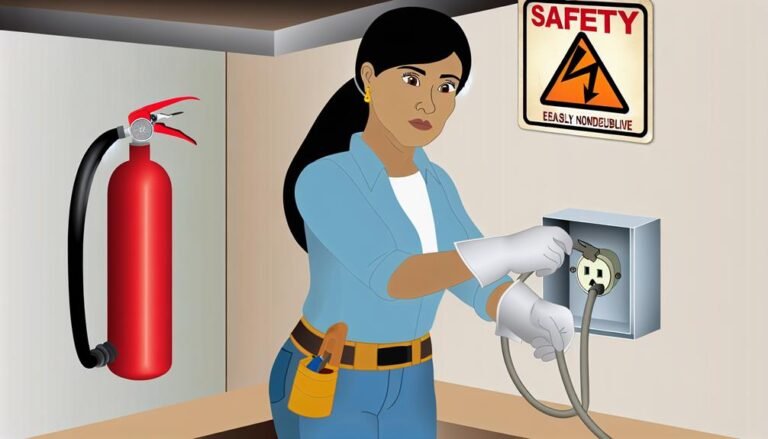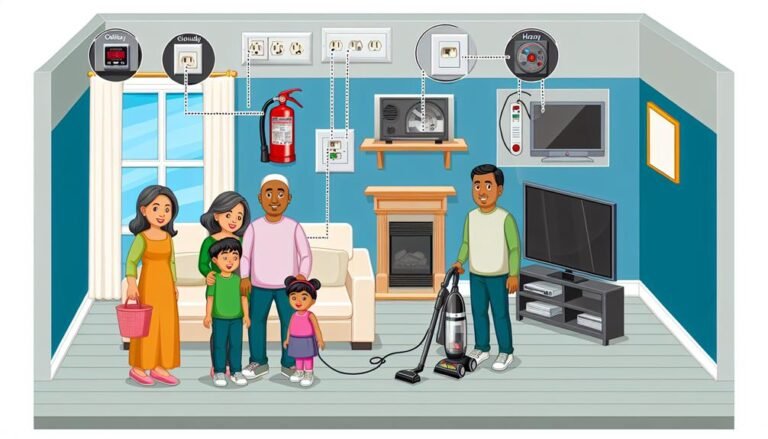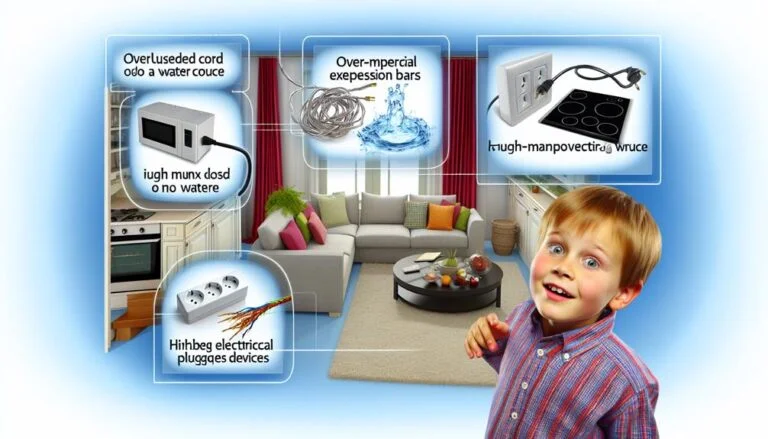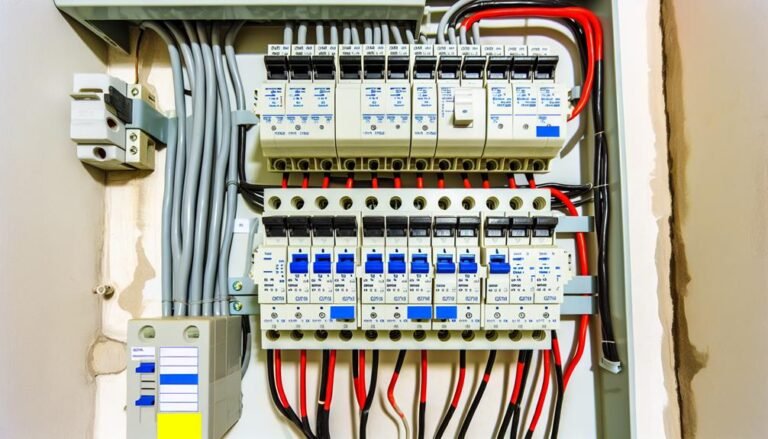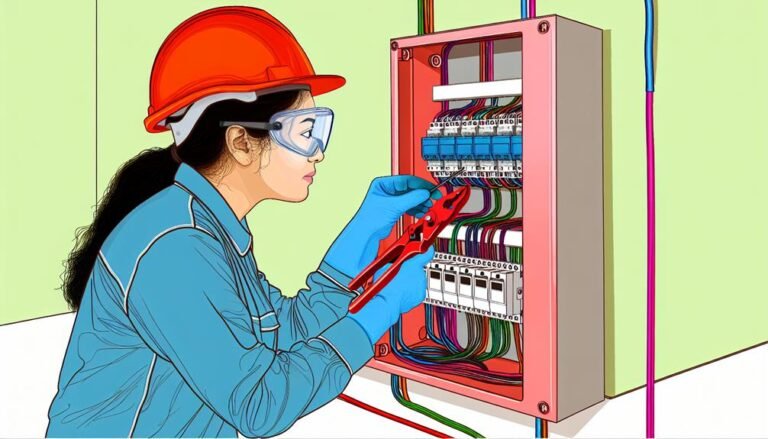Coincidentally, you may not realize the potential dangers that lurk within your electrical system until it's too late. With faulty wiring, overloaded circuits, and outdated equipment, the risk of electrical accidents is higher than you might think.
But fear not, because in this discussion, we will unveil the top 10 maintenance tips that can help you ensure electrical safety in your home or workplace. These tips will not only protect you from potential hazards but also provide you with the peace of mind you deserve.
So, let's dive into this electrifying topic and discover how you can keep yourself and your loved ones safe.
Key Takeaways
- Regular electrical maintenance is crucial for safety and efficiency.
- Faulty wiring, overloaded circuits, and damaged equipment can lead to fires and accidents.
- Promptly addressing electrical issues can prevent extensive property damage and loss of life.
- Hiring qualified electricians and establishing a maintenance schedule are essential for maintaining electrical safety.
Importance of Regular Electrical Maintenance
Regular electrical maintenance is crucial for ensuring the safety and efficiency of your electrical system. The importance of regular electrical inspections can't be overstated. By conducting regular inspections, you can identify potential hazards and address them before they become major issues. This helps to prevent electrical accidents, such as fires and electrocutions, which can cause serious harm or even death.
In addition to safety, there are several benefits of electrical maintenance. Regular inspections and maintenance can help to extend the lifespan of your electrical system, reducing the need for costly repairs or replacements. It also ensures that your system operates at peak efficiency, which can lead to energy savings and lower utility bills.
Furthermore, regular electrical maintenance can help to identify and fix any underlying electrical problems that may be causing issues with your appliances or devices. By addressing these issues promptly, you can prevent further damage and avoid the inconvenience of unexpected breakdowns or malfunctions.
Benefits of Routine Electrical Inspections
To ensure the ongoing safety and efficiency of your electrical system, it's essential to prioritize routine electrical inspections. By conducting these inspections regularly, you can identify potential hazards and address them before they become major issues. This not only helps to prevent electrical accidents but also ensures that your electrical system is operating at its optimal level.
One of the main benefits of routine electrical inspections is that they help to prevent electrical fires. Faulty wiring, overloaded circuits, and other electrical issues can lead to overheating and ultimately cause a fire. By identifying and correcting these issues during inspections, you can significantly reduce the risk of a fire occurring in your home or workplace.
Another benefit of electrical inspections is that they help to extend the lifespan of your electrical equipment. Regular inspections allow you to identify any wear and tear on your electrical system, such as frayed wires or loose connections. By addressing these issues promptly, you can prevent further damage and prolong the life of your equipment.
Furthermore, routine electrical inspections contribute to the overall safety of your property and the people within it. They ensure compliance with electrical safety regulations and codes, reducing the likelihood of accidents and injuries.
To fully reap the benefits of electrical inspections, it's also important to prioritize electrical safety training. This training equips individuals with the knowledge and skills to identify potential electrical hazards and take appropriate safety measures. By investing in electrical safety training, you empower yourself and your team to maintain a safe and efficient electrical system.
Common Electrical Hazards to Watch Out For
When it comes to electrical hazards, there are a few common ones that you need to watch out for.
- Faulty wiring can pose a serious danger, increasing the risk of electrical fires and electrocution.
- Overloaded circuits can also lead to overheating and potential fire hazards.
- Additionally, electrical appliance malfunctions can result in shocks or fires, so it's important to be vigilant and address any issues promptly.
Faulty Wiring Dangers
Faulty wiring poses significant risks to your electrical system and can potentially lead to dangerous electrical hazards. It's crucial to be aware of the dangers of faulty wiring to ensure the safety of your home or workplace.
Here are three key risks associated with faulty wiring:
- Electrical Fire Risks: Faulty wiring can cause electrical sparks, overheating, and short circuits, which can lead to electrical fires. These fires can spread quickly and cause extensive damage to property and put lives at risk.
- Electrical Shock Hazards: Faulty wiring increases the likelihood of electrical shocks. When exposed to live wires or faulty electrical connections, individuals may experience severe shocks, leading to injuries or even death.
- Damaged Appliances and Equipment: Faulty wiring can damage electrical appliances and equipment. It can cause fluctuations in voltage, leading to premature wear and tear, reduced lifespan, and increased risk of electrical malfunctions.
To mitigate these risks, it's essential to regularly inspect and maintain your electrical system, ensuring that all wiring is up to code and in good condition.
Overloaded Circuits Risks
Overloaded circuits pose significant risks to your electrical system and can result in potential electrical hazards. When a circuit is overloaded, it means that it's carrying more electrical current than it can handle. This can lead to overheating, which can cause fires or damage to your electrical appliances and devices.
The risks of overloading are especially high in older homes or buildings with outdated electrical systems that may not be able to handle the demands of modern technology. To prevent circuit overload, it's important to distribute the electrical load evenly across circuits and avoid plugging too many devices into a single outlet or power strip.
Additionally, regularly inspecting your electrical system and upgrading it as needed can help ensure that it can handle the demands of your modern lifestyle. By taking these precautions, you can reduce the risks associated with overloaded circuits and protect your electrical system from potential hazards.
Electrical Appliance Malfunctions
Electrical appliance malfunctions can pose serious hazards to your electrical system and should be closely monitored to ensure safety. Here are three common electrical hazards to watch out for when it comes to electrical appliance safety:
- Electrical shocks: Faulty wiring or damaged cords can lead to electrical shocks. Ensure that your appliances are properly grounded and that cords are in good condition. If you notice any frayed wires or exposed metal, immediately unplug the appliance and have it repaired or replaced.
- Overheating: Overheating appliances can cause fires. Regularly check for signs of overheating such as unusual smells, excessive heat, or discolored outlets. If you notice any of these signs, unplug the appliance and have it inspected by a qualified professional.
- Circuit tripping: Appliances that repeatedly trip circuit breakers may be drawing too much power or have internal wiring issues. It's important to troubleshoot these malfunctions to prevent further damage to your electrical system. Consider consulting an electrician to identify and resolve the underlying problem.
The Dangers of Ignoring Electrical Maintenance
Ignoring proper electrical maintenance can lead to significant risks and potential hazards in your home or workplace. Neglected maintenance poses dangers that can have severe consequences if ignored.
One of the most serious risks is the increased likelihood of electrical fires. Faulty wiring, overloaded circuits, and damaged electrical equipment can all contribute to the ignition of a fire. These fires can quickly spread and cause extensive damage to property and even result in the loss of life.
In addition to the risk of fires, neglected electrical maintenance can also lead to electrical shocks. Faulty or damaged electrical components can expose you to potentially lethal levels of electricity. This can happen when you come into contact with live wires or faulty appliances. Electrical shocks can cause severe burns, muscle contractions, and even cardiac arrest.
Moreover, ignoring electrical maintenance can result in costly repairs and replacements. When electrical systems aren't properly maintained, their lifespan is significantly reduced, leading to the need for more frequent repairs or even complete replacements.
Essential Tools for DIY Electrical Maintenance
To effectively maintain your electrical systems, it's crucial to have the right tools at your disposal. DIY electrical repairs can be a cost-effective way to handle minor issues, but it's important to follow electrical safety guidelines and have the necessary tools to ensure your safety.
Here are three essential tools you should have for DIY electrical maintenance:
- Voltage Tester: A voltage tester is a handheld device that allows you to check if there's electrical current flowing through a wire or outlet. It helps you identify live wires and avoid accidental shocks.
- Wire Strippers: Wire strippers are used to remove insulation from electrical wires. They've different-sized cutting slots to accommodate various wire thicknesses. Properly stripping wires ensures a secure connection when making repairs or installations.
- Insulated Screwdrivers: Insulated screwdrivers are designed to protect you from electric shock when working with live wires. They've a non-conductive handle and a fully insulated shaft. It's important to use insulated screwdrivers whenever you're working on electrical systems to prevent accidents.
Having these essential tools will enable you to safely and effectively perform DIY electrical maintenance. Remember to always follow electrical safety guidelines and consult a professional if you're unsure or dealing with complex electrical issues.
Signs That Your Electrical System Needs Maintenance
If you notice flickering lights or frequently tripping circuit breakers, it may be a sign that your electrical system requires maintenance. These warning signs shouldn't be ignored, as they indicate potential issues that could lead to electrical hazards or even fires. It's important to address these problems promptly to ensure the safety of your home and the people living in it.
Flickering lights may indicate loose wiring connections or overloaded circuits. When circuits are overloaded, the current flowing through them exceeds their capacity, leading to overheating and potential damage to the electrical system. Tripping circuit breakers, on the other hand, suggest a circuit overload or a short circuit. A short circuit occurs when a hot wire comes into contact with a neutral wire or a ground wire, causing a sudden surge of current that trips the circuit breaker.
If you experience these warning signs, it's advisable to seek a professional inspection of your electrical system. A licensed electrician can identify and address any underlying issues, ensuring the safety and proper functioning of your electrical system. They'll have the necessary expertise and knowledge to diagnose the problem accurately and provide the appropriate maintenance or repairs.
Regular professional inspections are also recommended even if you don't experience any warning signs. These inspections can help identify potential problems before they escalate, saving you from costly repairs or dangerous situations. Remember, electrical maintenance is crucial for the safety and well-being of your home, so don't hesitate to seek professional help when needed.
Tips for Hiring a Qualified Electrician for Maintenance
When it comes to ensuring the safety and proper functioning of your electrical system, hiring a qualified electrician for maintenance is essential. Here are three tips to help you navigate the hiring process and find the right professional for the job:
- Check for proper licensing and certification: A qualified electrician should have the necessary licenses and certifications required by your state or region. These credentials ensure that the electrician has undergone the necessary training and has the knowledge and skills to perform electrical work safely and effectively.
- Look for experience and expertise: It's important to hire an electrician who's experience in the specific type of maintenance work you require. Whether it's residential, commercial, or industrial electrical systems, finding an electrician with expertise in your area will ensure that they can handle any issues or challenges that may arise.
- Ask for references and reviews: Before hiring an electrician, ask for references from previous clients and check online reviews. This will give you an idea of the electrician's reputation and the quality of their work. Positive feedback and recommendations from satisfied customers are a good indication of a reliable and competent electrician.
How to Create an Electrical Maintenance Schedule
Creating an electrical maintenance schedule is crucial for ensuring the ongoing safety and efficiency of your electrical system. By establishing a maintenance routine, you can proactively identify and address potential issues before they become major problems. Start by creating a maintenance checklist that outlines the specific tasks that need to be performed regularly. This can include inspecting electrical panels, testing outlets and switches, checking for loose connections, and replacing worn-out components.
When creating your schedule, consider the age and condition of your electrical system. Older systems may require more frequent maintenance to ensure their continued functionality and safety. Additionally, take into account any specific requirements or recommendations from the manufacturer or electrical professionals.
It's important to stick to your maintenance schedule and perform the tasks consistently. Regular maintenance will help prevent electrical failures, reduce the risk of electrical fires, and extend the lifespan of your electrical system. Keep a record of all maintenance activities, including the date, tasks performed, and any issues discovered. This will help you track your progress and identify any recurring problems.
Steps to Take Before and During Electrical Maintenance
Before you begin electrical maintenance, it's crucial to properly prepare. This includes gathering the necessary tools and equipment, as well as ensuring you have a clear understanding of the task at hand.
Safety precautions should also be taken, such as wearing appropriate personal protective equipment and ensuring the power is turned off before starting any work.
Handling equipment with care and following best practices will help minimize the risk of accidents or injuries during the maintenance process.
Preparing for Maintenance
To ensure the highest level of safety during electrical maintenance, it's essential to take necessary precautions and follow proper protocols. Before starting any maintenance work, make sure to prepare adequately.
Here are three important steps to take before and during electrical maintenance:
- Conduct a thorough inspection: Before beginning any maintenance work, inspect the electrical system thoroughly. Look for signs of wear and tear, loose connections, and any potential hazards. Identify any components that need to be replaced or repaired.
- Isolate the power source: Safety should always be the top priority during electrical maintenance. Before starting any work, make sure to disconnect the power supply to the equipment or area being serviced. Use lockout/tagout procedures to prevent accidental re-energization.
- Use proper safety equipment: When performing electrical maintenance, always wear personal protective equipment (PPE) such as insulated gloves, safety glasses, and flame-resistant clothing. Additionally, use appropriate tools and equipment designed for electrical work to minimize the risk of accidents.
Safety Precautions
Inspecting the electrical system thoroughly and taking necessary precautions are critical steps to ensure safety during electrical maintenance. To prevent electrical accidents, it's essential to follow specific electrical safety measures.
Before starting any maintenance work, make sure to turn off the power supply to the area you'll be working on. This will minimize the risk of electric shock. It's also important to wear personal protective equipment, such as insulated gloves and safety goggles, to protect yourself from potential hazards.
Additionally, ensure that the area is well-lit and free from any clutter that could cause tripping or falling. Always use insulated tools and avoid working alone whenever possible.
Proper Equipment Handling
Make sure to handle equipment properly to ensure safety during electrical maintenance. Improper handling of equipment can lead to accidents and injuries. Here are three important steps to take before and during electrical maintenance to ensure safe equipment operation:
- Equipment Storage: Store electrical equipment in a clean and dry area, away from moisture and direct sunlight. Use appropriate storage containers and labels to keep equipment organized and easily accessible. Regularly inspect and maintain storage areas to prevent damage or deterioration of equipment.
- Inspect Equipment: Before using any electrical equipment, inspect it thoroughly for any signs of damage or wear. Check for loose connections, frayed wires, or other visible defects. If any issues are found, repair or replace the equipment immediately to avoid potential hazards.
- Follow Operating Instructions: Always read and follow the manufacturer's operating instructions for each piece of equipment. Use the equipment only for its intended purpose and within its specified limits. Never attempt to modify or repair equipment without proper training and authorization.
Frequently Asked Questions About Electrical Maintenance
When performing electrical maintenance, it's important to have a clear understanding of common questions that may arise.
One common question is about the cost of electrical maintenance. Electrical maintenance costs can vary depending on the complexity of the job and the professional hired. It's recommended to obtain multiple quotes from licensed electricians to ensure you're getting a fair price.
Another frequently asked question is whether it's possible to perform electrical maintenance tasks yourself. While there are some simple electrical maintenance tasks that can be done by homeowners, such as replacing light switches or installing new outlets, it's important to remember that electrical work can be dangerous and should only be done by those with the proper knowledge and training. It's always best to consult with a licensed electrician for any electrical maintenance work to ensure it's done correctly and safely.

